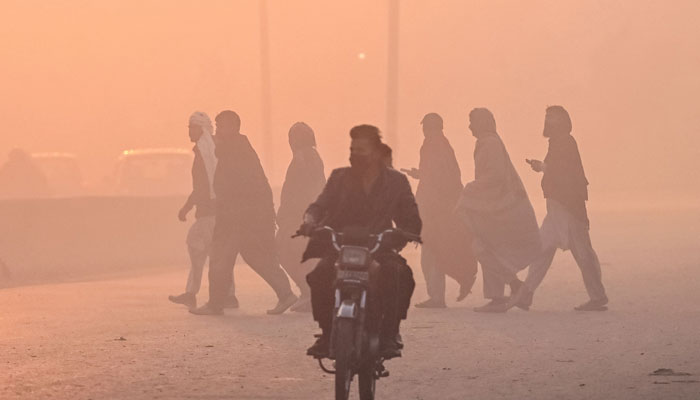India, Pakistan share climate challenges but not solutions
Two neighbouring nations get suffocated every winter by haze of pollution traversing their border
ISLAMABAD: Choking smog, scorching heat and ravaging floods -- India and Pakistan share the same environmental challenges, offering a rare but unrealised opportunity for collaboration, according to experts.
The neighbouring nations are suffocated every winter by a haze of pollution traversing their border. The countries, together making up a fifth of the world’s population, frequently blame each other for smog blustering into their respective territories.
But this year pollution reached record highs in Pakistan’s eastern and most populous province of Punjab, prompting the regional government to make a rare overture calling for “regional climate diplomacy”. India did not comment and whether they will unite to face a common foe remains to be seen. However, experts agree the two countries cannot tackle climate threats in isolation. “We are geographically, environmentally and also culturally the same people and share the same climatic challenges,” said Abid Omar, founder of the Pakistan Air Quality Initiative (PAQI). “We have to work transboundary,” he told AFP.
India and Pakistan are at the mercy of extreme weather which scientists say is increasing in frequency and severity, owing to climate change. In both countries, nearly half of people live below the poverty line, in a state of precarity where climate disasters can be devastating. “One would like to think that an urgent shared threat would bring the two sides together,” Michael Kugelman, South Asia Institute director at the Washington-based Wilson Center, told AFP. “The problem is that this hasn’t.”
But India, one of the world’s largest emitters of greenhouse gases, and Pakistan, one of the smallest, have never aligned their environmental laws, school or traffic closures, or shared technology and data. Indian economist and climate expert Ulka Kelkar highlighted the potential to collaborate on electric vehicle technology suited to South Asian needs. “In our countries, it’s two wheelers and three wheelers which most people tend to use,” she told AFP. “So research and development of vehicular technologies, battery technologies that are suited for our road conditions, warmer climates, our passenger use -- that’s the sort of discussion and common development that can happen.”
Experts say the geopolitical rivalry runs so deep that distrust undercuts any prospects of cooperation. The PAQI partnered with an Indian counterpart in 2019 to reconcile findings by installing matching air pollution sensors in each other’s countries. While breathing toxic air has catastrophic health consequences the one-year project was not renewed.
They do hold regular discussions on one critical climate issue: sharing rights to the Indus River which bisects Pakistan but is fed by tributaries in India. However geopolitical posturing in September saw New Delhi lobby Islamabad for a review of their water-sharing treaty, citing cross-border militant attacks, according to Indian media.
-
 Kim Kardashian And Lewis Hamilton Make First Public Appearance As A Couple At Super Bowl 2026
Kim Kardashian And Lewis Hamilton Make First Public Appearance As A Couple At Super Bowl 2026 -
 Romeo And Cruz Beckham Subtly Roast Brooklyn With New Family Tattoos
Romeo And Cruz Beckham Subtly Roast Brooklyn With New Family Tattoos -
 Meghan Markle Called Out For Unturthful Comment About Queen Curtsy
Meghan Markle Called Out For Unturthful Comment About Queen Curtsy -
 Bad Bunny Headlines Super Bowl With Hits, Dancers And Celebrity Guests
Bad Bunny Headlines Super Bowl With Hits, Dancers And Celebrity Guests -
 Insiders Weigh In On Kim Kardashian And Lewis Hamilton's Relationship
Insiders Weigh In On Kim Kardashian And Lewis Hamilton's Relationship -
 Prince William, Kate Middleton Private Time At Posh French Location Laid Bare
Prince William, Kate Middleton Private Time At Posh French Location Laid Bare -
 Stefon Diggs Family Explained: How Many Children The Patriots Star Has And With Whom
Stefon Diggs Family Explained: How Many Children The Patriots Star Has And With Whom -
 ‘Narcissist’ Andrew Still Feels ‘invincible’ After Exile
‘Narcissist’ Andrew Still Feels ‘invincible’ After Exile -
 Shamed Andrew ‘mental State’ Under Scrutiny Amid Difficult Time
Shamed Andrew ‘mental State’ Under Scrutiny Amid Difficult Time -
 Bad Bunny's Super Bowl Halftime Show: What Time Will He Perform Tonight?
Bad Bunny's Super Bowl Halftime Show: What Time Will He Perform Tonight? -
 Where Is Super Bowl 2026 Taking Place? Everything To Know About The NFL Showdown
Where Is Super Bowl 2026 Taking Place? Everything To Know About The NFL Showdown -
 Chris Pratt Explains Why He And Katherine Schwarzenegger Did Premarital Counseling
Chris Pratt Explains Why He And Katherine Schwarzenegger Did Premarital Counseling -
 Drake 'turns Down' Chance To Hit Back At Kendrick Lamar At Super Bowl
Drake 'turns Down' Chance To Hit Back At Kendrick Lamar At Super Bowl -
 Sarah Ferguson Had A ‘psychosexual Network’ With Jeffrey Epstein
Sarah Ferguson Had A ‘psychosexual Network’ With Jeffrey Epstein -
 Miranda Kerr Shares The One Wellness Practice She Does With Her Kids
Miranda Kerr Shares The One Wellness Practice She Does With Her Kids -
 Czech Republic Supports Social Media Ban For Under-15
Czech Republic Supports Social Media Ban For Under-15




